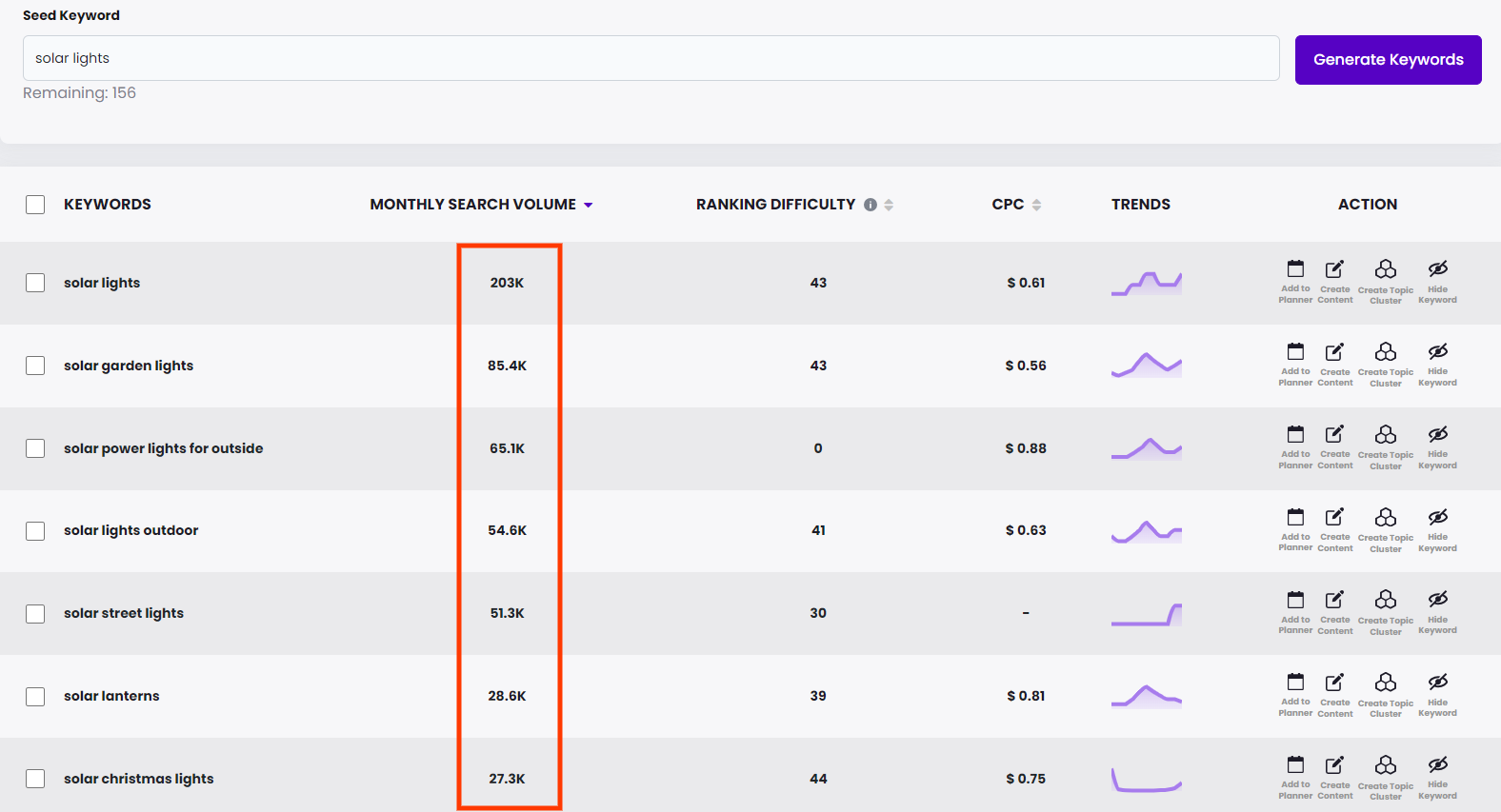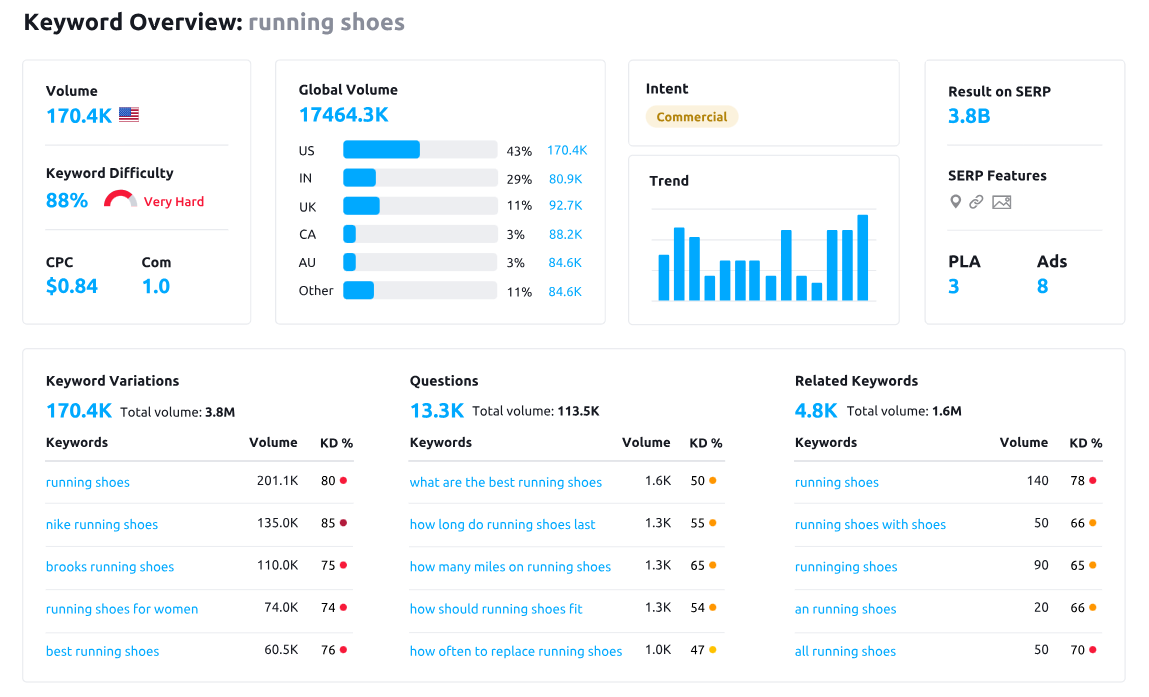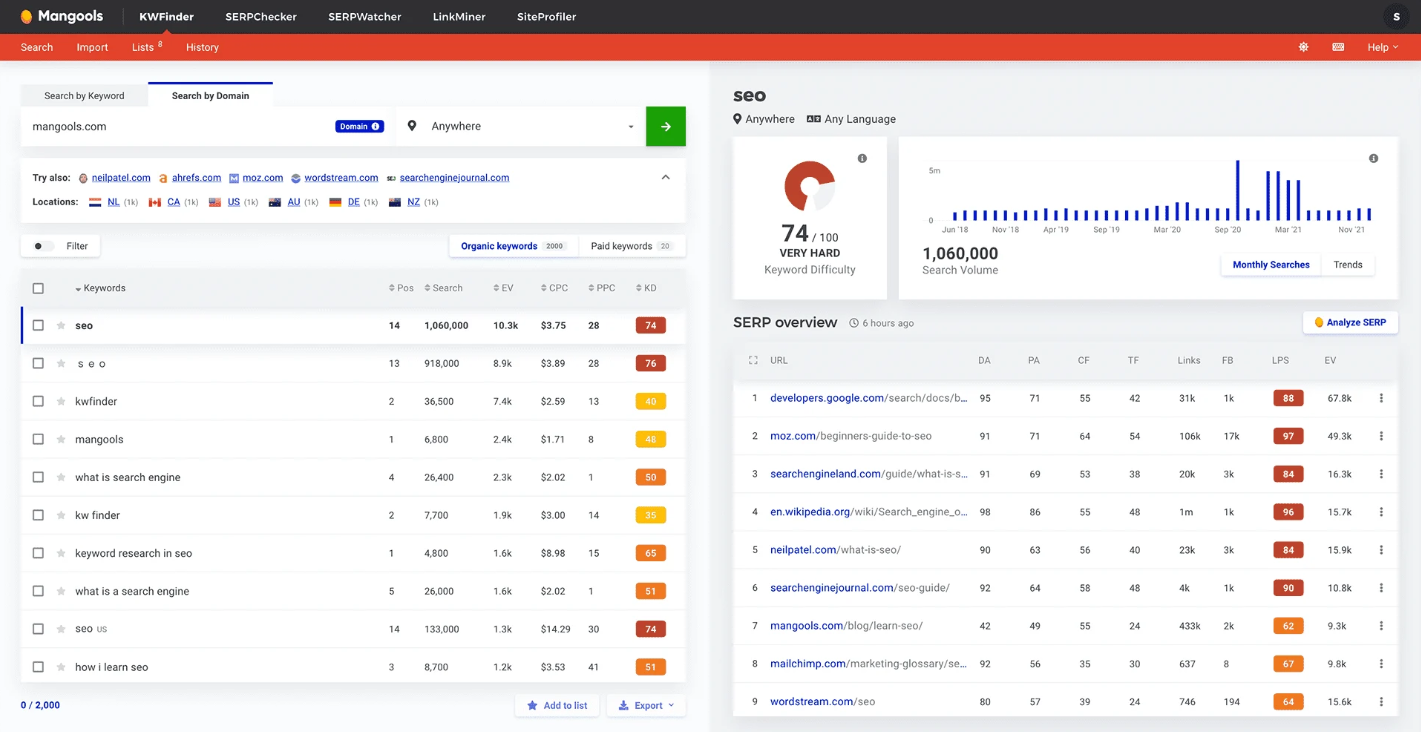Content is to marketing as what fuel is to fire.
Content helps educate audiences and builds loyalty with existing customers. And as 67% of marketers report, using content in your marketing helps generate business leads.
To drive relevant traffic to your website, it’s essential to target topics that your target customers are searching for in Google. You have to optimize your content around keywords with verifiable search volume.
And for that, you need a keyword research tool that provides accurate keyword search volume data.
This post is a deep dive into the mechanics of keyword search volume. Particularly, we’ll discuss why it’s important to be certain of the accuracy of the search volume of keywords you target in your content.
With that, we’ll answer the question of which keyword research tool provides the most accurate keyword search volume data.
Let’s dive in.
Table Of Contents:
- What is Keyword Search Volume?
- How is Keyword Search Volume Calculated?
- Why is Keyword Search Volume Important?
- Should I Ignore Low-Volume Keywords for SEO?
- Which SEO Tool Has the Most Accurate Keyword Search Volume?
- How to Select the Right Keyword Research Tool for Your Needs
- FAQs – Accurate Keyword Search Volume
- Conclusion
What is Keyword Search Volume?
Keyword search volume refers to the average number of times a keyword is searched per month. It is an important metric that SEO professionals track to measure the success of their SEO and content marketing campaigns.

BrandWell’s keyword research tool
The most frequently used metric in SEO, keyword search volumes are a reliable indicator of consumer interest in a topic. It’s especially useful for creating marketing plans and identifying target audiences.
On the BrandWell keyword research tool, monthly search volume is the first metric you will see when you generate keywords for a seed topic.
When it’s accurate, keyword search volume data helps marketers make better decisions about where to invest their resources for maximum ROI. And that’s the challenge SEO professionals face – determining the accuracy of keyword search volume data. We will get to that in a moment, but first:
How is Keyword Search Volume Calculated?
Keyword search volume is calculated by dividing the number of times a keyword was searched in search engines over the preceding 12 months by 12. This means keyword search volume is usually expressed as a monthly average, though this can change depending on the tool you’re using.
The data that SEO tools use to calculate search volume is provided by third parties and sorted using machine learning algorithms. Many SEO tools also pull their search volume data from Google Search Console and Google Keyword Planner.
To ensure accuracy and account for changing search trends, SEO tools update their search volume data monthly. However, that still may not adequately address the accuracy question, especially for seasonal queries and trending topics.
Why is Keyword Search Volume Important?
Accurate keyword search volume is powerful for understanding the potential of your content and optimizing it to reach its full potential. By relying on precise volume data, you can create successful SEO plans likely to result in more website visits and exposure for your business.
Accurate Prediction of Traffic Potential
Accurate keyword search volume data helps to identify the keywords that are most likely to bring in organic traffic from searches. This allows you to optimize your content accordingly, ensuring that it ranks for keywords with business value.
When you rank in Google for high-volume keywords you also increase your visibility online, which leads to greater exposure for your products and brand. That has the bigger benefit of driving more qualified leads to your business.
Access to accurate keyword search volume also saves you from wasting time optimizing for keywords with low traffic potential.
Pro tip: Use keyword data from the BrandWell SEO sidebar to identify topically related keywords you can use to further optimize your article and widen its traffic sources. The AI pulls these keywords from articles ranking high in Google for your target keyword. Essentially, this is done-for-you secondary keyword research.

Should I Ignore Low-Volume Keywords for SEO?
While it may seem logical to disregard low-volume keywords due to the presumption of them being low traffic generators, this assumption doesn’t always hold true. It’s crucial to understand that search volume and traffic are not necessarily correlated.
Topic clusters, also known as content hubs, consist of a main page (also called pillar page) targeted at the primary higher volume keyword and several related pages linking back to it covering more specific subtopics. This strategic approach signals search engines like Google that your site is an authority on the given topic, which can lead to significant results.
Pro tip: BrandWell‘s in-app keyword research tool allows you to create topic clusters in just one click. From its main keywords list, simply click “Create Topic Cluster” and then click “Create Content” to start building your content hub.

Lower-volume keywords can be beneficial in creating relevant spoke content around your main topics if they relate closely to the pillar topic. Often these lower-volume or long-tail keywords reflect a more precise intent from users than head terms do. Consequently, while individual pages optimized for each long-tail keyword might not drive massive amounts of traffic themselves, collectively they contribute significantly towards overall website performance.
Why Are Low-Volume Keywords Important?
- Niche industries: For industries where there isn’t much search volume, such as niche sectors or topics, lower-volume keywords become critical players.
- User intent: These specific phrases often match closer with user intent compared to broader terms—making them highly valuable despite their lower average monthly search volumes.
- SERP competition: Lower competition means you have a better chance of ranking high in organic search results by targeting less competitive but still relevant queries associated with these key phrases.
Keyword Research Tools: Accuracy Matters!
The accuracy of keyword research tools plays an essential role in an effective keyword research process because inaccurate search volumes could lead you down the wrong path when planning SEO strategies.
A popular tool among marketers is Google’s Keyword Planner, but is Google Keyword Planner accurate?
While the Google Keyword Planner pulls its data straight from the source — Google — its estimates are sometimes criticized for lack of precision especially when dealing with smaller niches.
That said, Semrush, Ahrefs, and KWFinder offer alternative solutions providing additional features including ranking difficulty suggestions, explorer capabilities, etc.
Which SEO Tool Has the Most Accurate Keyword Search Volume?
Let’s look at four of the most popular keyword research tools for finding average search volumes.
1. Google Keyword Planner
Google Keyword Planner has the most accurate keyword search volume data. Since it is a Google property, GKP pulls search volume data directly from the Google search engine. This is real-time data that tells you what your target audience is searching Google for right now.
While keyword data from Google Keyword Planner is primarily intended to help advertisers on Google Search plan their campaigns, you can use the same data for standard website SEO and content strategy.
The biggest advantage of using Google Keyword Planner for finding search volume data, especially if you’re just starting out and have a limited budget, is that it’s a free tool. No other free tool offers you the same level of access to keyword search volume data.
The one downside to Google Keyword Planner is its limited functionality. So if you are looking for more advanced features and filtering capabilities, you’ll have to look into the premium tools on the market.
If you have the budget for a premium keyword research tool, Semrush has the most recommendations for accurate keyword search volume data. Ahrefs and KWFinder are other tools that have received good reviews for accurate data. (We’ll talk about these tools in the following sections.)

Screenshot from Google Keyword Planner, July 2023
2. Semrush
Semrush digs into an extensive database of over 20 billion keywords, which is updated daily. It also utilizes clickstream data from multiple sources, ensuring it captures real user behavior accurately across different regions and devices. This results in providing reliable average monthly search volumes for specific keywords.
Besides the large search volume numbers that high-volume keywords can bring about, Semrush equally excels at identifying low-volume keywords — often long-tail ones — which are less competitive but could still drive significant traffic when used strategically.
Apart from its impressive accuracy in determining keyword volumes, other features that make Semrush a go-to tool for effective keyword research are:
- Keyword difficulty score: A metric that estimates how hard it would be to outrank competitors on SERPs based on a particular keyword.
- Keyword Magic Tool: Provides thousands of related long-tail and phrase match suggestions, helping you discover more opportunities while conducting your research process.
- CPC data & competition level: Provides insight into the potential profitability of targeting certain terms based on their estimated cost-per-click (CPC) value in Google Ads alongside competition levels.
SemRush doesn’t just stop at providing detailed insights regarding individual words; it extends its functionality by providing comprehensive reports about organic rankings too! You get access to historical ranking changes per term along with visibility trends – all essential aspects when deciding which phrases should be prioritized during optimization efforts.

Screenshot from Semrush
3. Ahrefs
Ahrefs is another popular keyword research tool that provides an estimation of average monthly search volumes for specific keywords. It offers valuable insights into large search volumes and low-volume keywords which can help prioritize keywords during your effective keyword research process.
Two of the most important metrics you want to look at are:
- Click-through rates: It’s worth noting that high search volumes don’t always equate to high traffic. Many searches result in no clicks due to factors such as ads taking up space in organic search results or users finding their answers directly from snippets without needing to click further.
- Traffic potential over search volume: When conducting keyword research with Ahrefs, consider focusing more on traffic potential rather than just raw search volume numbers. This metric gives a better prediction of potential organic traffic by considering all ranking pages’ estimated visits for your targeted term instead of relying solely on the main target’s average monthly volume.
Screenshot from Ahrefs
4. KWFinder
KWFinder from Mangools is another keyword research tool that’s known to provide highly accurate search volume data.
KWFinder offers detailed insights into average monthly search volumes, helping marketers understand which terms are most frequently used by their audience. Whether targeting long-tail keywords or more competitive phrases, KWFinder provides an accurate representation of potential organic reach.
In comparison with Google’s Keyword Planner or Google Search Console, KWFinder has proven itself superior due to its emphasis on precision and comprehensiveness. Unlike many platforms that provide estimated figures based on broad ranges or outdated information, KWFinder uses real-time data gathered directly from Google’s API ensuring up-to-date and precise results.
Besides offering reliable search volume estimates for both large and low-volume keywords, this tool also presents valuable metrics such as keyword difficulty scores and competition levels – essential factors in deciding whether a particular term should be targeted or not.
To effectively conduct keyword research using KFWFinder:
- Determine desired keywords related to your niche/content topic.
- Enter them into Keyword Explorer.
- Analyze provided metrics (average monthly searches, popularity among competitors).
- Prioritize those with a good balance between high search volumes and manageable competition levels.
- Create content around chosen terms aiming at top positions in SERPs.
By leveraging accurate keyphrase volume statistics provided by KWFinder alongside other useful indicators like competitiveness and relevancy score, brands can optimize their digital presence while achieving better rankings in organic results — thus increasing visibility online.

Screenshot from Mangools
Pro tip: BrandWell‘s in-app keyword research tool also pulls its data from Mangools, so you can dig into those numbers without ever leaving the app. Best of all, there is no need to assemble your list on a spreadsheet — just tick those keywords you want to rank for and click “Create Content” to get in-depth blog posts for your topic within minutes!
While determining good keyword search volume is essential for SEO success, it should not be seen as an end-all-be-all solution but rather used alongside other metrics such as difficulty score and competition levels.
Remember: The ultimate goal isn’t just about having a good keyword search volume but driving meaningful traffic toward your site.
How to Select the Right Keyword Research Tool for Your Needs
When deciding on an SEO tool, there’s a lot to consider. As you are rightly researching right now, you want to make sure the tool has accurate keyword search volume data.
Many tools offer estimates of search volume based on past trends or similar keywords, but these tools can be inaccurate and therefore unreliable. A dependable SEO tool should give you up-to-date data so you can accurately predict how much traffic you are likely to get.
Look for Advanced Filtering Capabilities
The tool you choose must allow you to filter keyword data according to factors most relevant to your business and audience. For example, you may want the ability to narrow down your results by region or language.
Generally, you want a tool that allows you to gain as many insights as possible into the keywords you are considering targeting. For example, it’s helpful for your keyword analysis if a keyword research tool provides data on keyword difficulty and related searches.
Check for More Helpful Features
In an attempt to sell their software as feature-rich, SEO tools often fall into the trap of stuffing them with nonessential features. Thus, to ensure you’re not wasting money, analyze a keyword research tool by the usefulness of its features.
Compare a tool’s features against your needs to decide whether it offers enough value. A feature that tells you how a keyword has trended over time, for example, may be invaluable for planning your content.
FAQs – Accurate Keyword Search Volume
What is a good search volume for keywords?
The ideal search volume for keywords depends on your specific content marketing goals and SEO strategy. Generally, the higher the search volume the better.
A high-volume keyword is likely to pull more traffic to your website, but that only depends on whether you can rank for that keyword. Such keywords attract competition from high DR websites and may be tough to rank for. If your site has a low DR, you may achieve better results by targeting keywords that are not searched for as much.
Which SEO tool has the most accurate keyword search volume?
Google Keyword Planner is widely regarded as the tool with the most accurate keyword search volume data. Though it has limited functionality, GKP measures some helpful search factors, such as competition level and suggested bid amounts for paid campaigns. This makes it a great resource for any SEO professional looking to gain insight into their target audience’s interests and behaviors.
Is Semrush search volume accurate?
Semrush is among the premium tools most trusted for the accuracy of its keyword search volume data. Semrush gets its data from such reliable sources as Google Ads and Google Search Console. The keyword research tool regularly updates its database with new information to ensure its data remains as accurate as possible for users.
Why is keyword search volume important?
Keyword search volume helps you make informed decisions about your SEO strategy and content marketing. By understanding the frequency with which specific terms are searched, you can recognize which topics offer the highest traffic potential. That allows you to create content that resonates with your audience.
Conclusion
Creating content on random topics whose search popularity you are not sure of is a waste of your marketing dollars. Because such content does not directly target traffic relevant to your business, that traffic seldom leads to an increase in demand for your products.
Using accurate keyword search volume will help you accurately gauge the potential of your content and optimize it to reach its full potential. Without a reliable SEO tool that provides accurate keyword search volume data, you risk targeting irrelevant keywords in your content. Traffic from these searches is unlikely to convert into profitable leads for your business.
Bottom line: Accurate keyword search volume data is a must-have for any SEO strategy. It helps to maximize organic rankings, drive more qualified leads and visibility, and give brands the edge in user experience. Leveraging this information correctly will ensure that businesses don’t waste money on inaccurate targeting decisions.
Sign up for BrandWell to explore how our tools can help you identify valuable keywords and build stronger content strategies.





